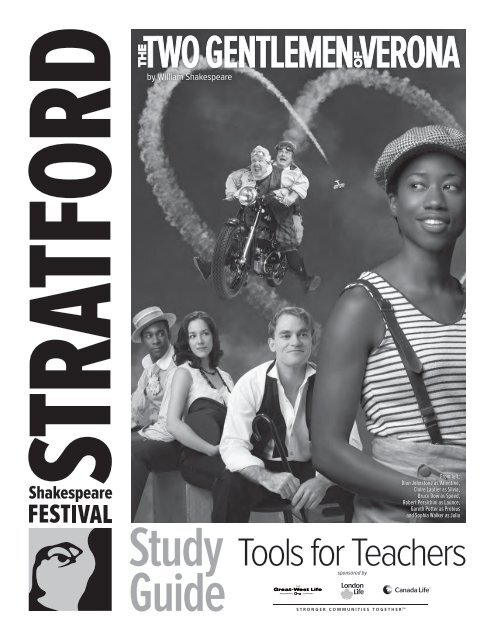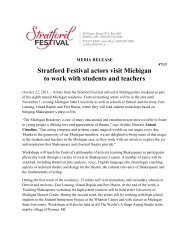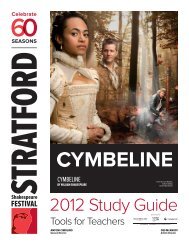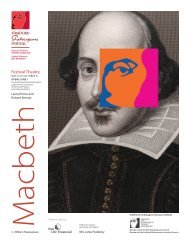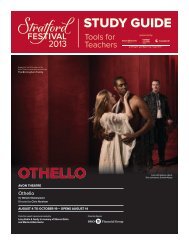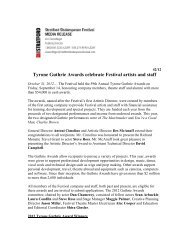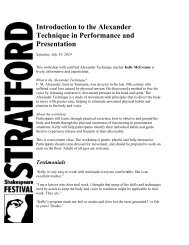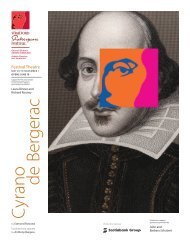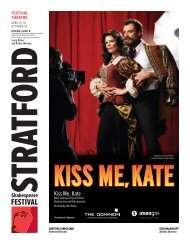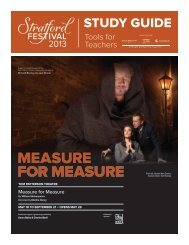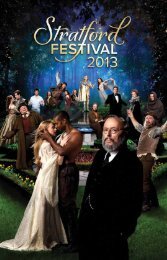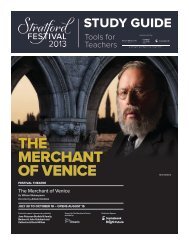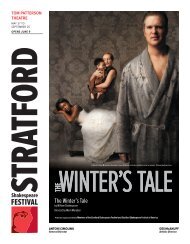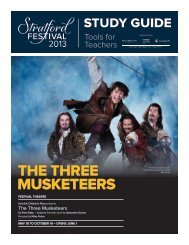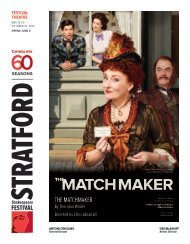Study Guide - Stratford Festival
Study Guide - Stratford Festival
Study Guide - Stratford Festival
You also want an ePaper? Increase the reach of your titles
YUMPU automatically turns print PDFs into web optimized ePapers that Google loves.
y William Shakespeare<br />
From left:<br />
Dion Johnstone as Valentine,<br />
Claire Lautier as Silvia,<br />
Bruce Dow as Speed,<br />
Robert Persichini as Launce,<br />
Gareth Potter as Proteus<br />
and Sophia Walker as Julia<br />
<strong>Study</strong><br />
<strong>Guide</strong><br />
Tools for Teachers<br />
sponsored by
Table of Contents<br />
1. The Story ............................................................................................page 1<br />
2. Cast of Characters...................................................................................... 1<br />
3. The Playwright ........................................................................................... 2<br />
4. History of The Two Gentlemen of Verona at <strong>Stratford</strong> ...................... 5<br />
5. Imaginative Ways to Approach the Text ............................................... 6<br />
6. Discussion Topics.....................................................................................12<br />
7. Resources...................................................................................................13<br />
The Two Gentlemen of Verona <strong>Study</strong> <strong>Guide</strong><br />
<strong>Stratford</strong> Shakespeare <strong>Festival</strong> 2010
The Story<br />
Having decided to leave Verona to seek his fortune in Milan, Valentine takes<br />
leave of his friend Proteus, who prefers to stay at home and woo his lover, Julia.<br />
Soon afterwards, however, Proteus is ordered by his father to follow Valentine –<br />
which he does, after swearing an oath of allegiance to Julia. In Milan, Valentine<br />
falls in love with Silvia, daughter of the Duke, and plans to elope with her.<br />
Proteus, however, no sooner sets eyes on Silvia than he too becomes besotted<br />
with her. Forgetting both his friendship for Valentine and his oath to Julia, he<br />
betrays the lovers’ intentions to the Duke, who promptly banishes Valentine. To<br />
assist him in his fruitless attempts to woo Silvia for himself, Proteus then<br />
engages the services of a page boy, Sebastian – unaware that this “boy” is in<br />
fact the distraught Julia, who has disguised herself in order to follow her<br />
faithless lover. Fleeing the court to escape the equally unwelcome attentions of<br />
both Proteus and the suitor chosen for her by her father, Silvia is taken prisoner<br />
by a band of outlaws. She is “rescued” by Proteus, who then threatens her with<br />
rape. Fortunately, Valentine intervenes, confrontation leads to forgiveness, and<br />
all the parties are happily reconciled at last.<br />
Cast of Characters<br />
DUKE of Milan<br />
SILVIA, his daughter<br />
PROTEUS, a gentleman of Verona<br />
LANCE, his clownish servant<br />
VALENTINE, a gentleman of Verona<br />
SPEED, his clownish servant<br />
THURIO, a foolish rival to Valentine<br />
ANTONIO, father of Proteus<br />
PANTHINO, his servant<br />
JULIA, beloved of Proteus<br />
LUCETTA, her waiting-woman<br />
HOST, where Julia lodges<br />
SIR EGLAMOUR, agent for Silvia in her escape<br />
OUTLAWS<br />
Servants, musicians<br />
The Two Gentlemen of Verona <strong>Study</strong> <strong>Guide</strong> 1<br />
<strong>Stratford</strong> Shakespeare <strong>Festival</strong> 2010
The Playwright:<br />
William Shakespeare<br />
Born in <strong>Stratford</strong>-upon-Avon, a small<br />
Warwickshire town, in 1564, William<br />
Shakespeare was the eldest son of John<br />
Shakespeare, a glover, and Mary Arden, the<br />
daughter of a wealthy farmer. The exact date<br />
of his birth is unknown, but baptismal records<br />
point to it being the same as that of his death,<br />
April 23. He probably attended what is now the<br />
Edward VI Grammar School, where he would<br />
have studied Latin literature, and at 18, he<br />
married a farmer’s daughter, Anne Hathaway,<br />
with whom he had three children: Susanna,<br />
born in 1583, and, two years later, the twins<br />
Hamnet (who died in childhood) and Judith.<br />
Nothing further is known of his life until 1592,<br />
when his earliest known play, the first part of<br />
Henry VI, became a hit in London, where<br />
Shakespeare was now working as an actor.<br />
Soon afterwards, an outbreak of the plague<br />
forced the temporary closure of the theatres,<br />
and Shakespeare turned for a while to writing poetry. By 1594, however, he was<br />
back in the theatre, acting with the Lord Chamberlain’s Men. He quickly<br />
established himself as one of London’s most successful dramatists, with an<br />
income that enabled him, in 1957, to buy a mansion back in <strong>Stratford</strong>. In 1599 he<br />
became a shareholder in London’s newly built Globe Theatre.<br />
In 1603, Shakespeare’s company was awarded a royal patent, becoming known<br />
as the King’s Men. Possibly as early as 1610, the playwright retired to his home in<br />
<strong>Stratford</strong>-upon-Avon, living there – and continuing to invest in real estate – until<br />
his death on April 23, 1616. He is buried in the town’s Holy Trinity Church.<br />
In the first collected edition of his works in 1623, fellow dramatist Ben Jonson<br />
called him a man “not of an age, but for all time”. Not only did Shakespeare<br />
write some of the most popular plays of all time, but he was a very prolific writer,<br />
writing 38 (canonically accepted) works in 23 years. His work covered many<br />
subjects and styles, including comedies, tragedies, histories, and romances, all<br />
bearing his hallmark expansive plots, extraordinary language, and humanist<br />
themes. Shakespeare enjoyed great popularity in his lifetime, and 400 years<br />
later, he is still the most produced playwright in the world.<br />
The Two Gentlemen of Verona <strong>Study</strong> <strong>Guide</strong> 2<br />
<strong>Stratford</strong> Shakespeare <strong>Festival</strong> 2010
A Shakespearean Timeline<br />
1558 Elizabeth I crowned.<br />
1564 William Shakespeare born.<br />
1572 Actors not under the protection of a patron declared rogues and<br />
vagabonds.<br />
1576 “The Theatre,” the first public playhouse in London, opens.<br />
1577 “The Curtain,” London’s second playhouse, opens.<br />
1578 James VI (later James I of England) takes over government of<br />
Scotland.<br />
1579 Publication of North’s English translation of Plutarch’s Lives of the<br />
Noble Grecians and Romans.<br />
1580 Francis Drake returns in triumph form his voyage around the world;<br />
travelling players perform at <strong>Stratford</strong>.<br />
1582 Shakespeare marries Anne Hathaway; Susanna is born six months<br />
later and the twins Hamnet and Judith in 1585.<br />
1587 “The Rose” theatre opens in London. Mary Queen of Scots is<br />
executed.<br />
1588 Spanish Armada defeated.<br />
1589 Shakespeare finds work as an actor in London; he lives apart from<br />
his wife for 21 years.<br />
1590-1591 The Two Gentlemen of Verona, The Taming of the Shrew.<br />
1591 2 Henry VI, 3 Henry VI.<br />
1592 Thousands die of plague in London; theatres closed. 1 Henry VI,<br />
Titus Andronicus, Richard III.<br />
1593 The Comedy of Errors.<br />
1594 Shakespeare becomes a shareholder of his theatre company, the<br />
Lord Chamberlain’s Men.<br />
1594 Love’s Labour’s Lost.<br />
1595 Richard II, Romeo and Juliet, A Midsummer Night’s Dream.<br />
1596 Shakespeare’s son, Hamnet, dies.<br />
1596-1597 King John, The Merchant of Venice, 1 Henry IV.<br />
1597-1598 The Merry Wives of Windsor, 2 Henry IV, Much Ado About Nothing.<br />
1598 “The Globe” theatre built.<br />
The Two Gentlemen of Verona <strong>Study</strong> <strong>Guide</strong> 3<br />
<strong>Stratford</strong> Shakespeare <strong>Festival</strong> 2010
1598-1599 Henry V, Julius Caesar.<br />
1599-1600 As You Like It.<br />
1600-1601 Hamlet, Twelfth Night.<br />
1601 Shakespeare’s patron arrested for treason following the Essex<br />
rebellion; he is later pardoned.<br />
1602 Troilus and Cressida.<br />
1603 Queen Elizabeth dies and is succeeded by James I; Shakespeare’s<br />
theatre company becomes the King’s Men.<br />
1603 Measure for Measure, Othello.<br />
1604 Work begins on the King James Bible.<br />
1604-1605 All’s Well That Ends Well, Timon of Athens, King Lear (Q)<br />
1606 Macbeth, Antony and Cleopatra.<br />
1607 Pericles.<br />
1608 Coriolanus.<br />
1609 The Winter’s Tale.<br />
1610 King Lear (F), Cymbeline.<br />
1610 Shakespeare retires to <strong>Stratford</strong>-upon-Avon.<br />
1611 The Tempest.<br />
1611 King James Bible published.<br />
1613 Henry VIII (All Is True), The Two Noble Kinsmen.<br />
1613 “The Globe” theatre burns down.<br />
1616 Shakespeare dies in <strong>Stratford</strong>-upon-Avon.<br />
1623 The first folio of Shakespeare’s collected plays is published.<br />
* Some dates are approximate.<br />
The Two Gentlemen of Verona <strong>Study</strong> <strong>Guide</strong> 4<br />
<strong>Stratford</strong> Shakespeare <strong>Festival</strong> 2010
<strong>Festival</strong> Production<br />
History<br />
There have been six other productions of The Two Gentlemen of Verona at the<br />
<strong>Stratford</strong> Shakespeare <strong>Festival</strong>.<br />
1958 (tour): Directed by Michael Langham, with Ann Morrish as Julia, Lloyd<br />
Bochner as Proteus, Diana Maddox as Silvia and Eric House as Valentine.<br />
Designed by Tanya Moiseiwitsch.<br />
1975 (Avon Theatre): Directed by Robin Phillips, with Mia Anderson as Julia,<br />
Nicholas Pennell as Proteus, Jackie Burroughs as Silvia and Stephen Russell as<br />
Valentine. Designed by Molly Harris Campbell.<br />
1984 (Third Stage, now the Tom Patterson Theatre): Directed by Leon Rubin,<br />
with Maggie Huculak as Julia, David Clark as Proteus, Michelle Fisk as Silvia and<br />
Robert McClure as Valentine. Designed by Pat Flood.<br />
1988 (Avon Theatre): Directed by Robert Beard, with Peggy Coffey as Julia,<br />
Henry Czerny as Proteus, Kim Horsman as Silvia and John Wojda as Valentine.<br />
Designed by Brian Jackson.<br />
1992 (Tom Patterson Theatre): Directed by Marti Maraden, with Helen Taylor as<br />
Julia, Scott Fisher and Neil Ingram as Proteus, Daria Martel as Sylvia and Mervon<br />
Mehta as Valentine. Designed by Debra Hanson.<br />
1998 (<strong>Festival</strong> Theatre): Directed by Richard Rose, with Melody A. Johnson as<br />
Julia, David Jansen as Proteus, Tamara Bernier as Silvia and Graham Abbey as<br />
Valentine. Designed by Teresa Przybylski.<br />
The Two Gentlemen of Verona <strong>Study</strong> <strong>Guide</strong> 5<br />
<strong>Stratford</strong> Shakespeare <strong>Festival</strong> 2010
Imaginative Ways to Approach the Text<br />
Conversations for Two<br />
Grade Level 4 - 12<br />
Ontario<br />
Curriculum<br />
Expectations<br />
Drama: Creating and Presenting (4 - 8)<br />
Drama: Theory, Creation, Analysis (9 - 12)<br />
Time Needed one class period<br />
Space open space, no desks<br />
Materials none<br />
Setting up the exercise:<br />
Students are going to improvise short scenes. The number one rule of<br />
improvising is you can’t say no: you must work with everything your<br />
partner does – even if you have to change what you had planned – and<br />
incorporate it into the scene.<br />
Agree on the signal to start the improv and the signal to end.<br />
The exercise:<br />
Pair up students; provide enough room for each pair to work without<br />
disturbance from others.<br />
Provide one or more of the scene starters listed below.<br />
Give the signal to start the improv.<br />
After no more than three minutes, give the signal to end.<br />
Have students find another partner and repeat with another topic.<br />
Scene starters:<br />
Two friends discuss a romantic interest they have in a third party. Neither<br />
knows initially that they are both interested in the same person.<br />
<br />
<br />
<br />
<br />
<br />
<br />
<br />
One friend tries to convince a less adventurous friend to go skydiving.<br />
A mother tried to convince her reticent child to go on an exchange to<br />
another country.<br />
Two friends discuss a forbidden relationship between two people they<br />
both know.<br />
One young person reveals to another a plan to steal something valuable.<br />
One person reveals to another that he/she witnessed the other’s love<br />
interest in a compromising position with someone else.<br />
A student is caught cheating on a test by a teacher.<br />
A father informs his child that he/she is no longer welcome in the family<br />
home.<br />
The Two Gentlemen of Verona <strong>Study</strong> <strong>Guide</strong> 6<br />
<strong>Stratford</strong> Shakespeare <strong>Festival</strong> 2010
Imaginative Ways to Approach the Text<br />
Soundscapes<br />
Grade Level 4 - 12<br />
Ontario<br />
Curriculum<br />
Expectations<br />
Drama: Creating and Presenting (4 - 8)<br />
Drama: Theory, Creation, Analysis (9 - 12)<br />
Time Needed one class period<br />
Space open space, desks cleared away<br />
Materials three scene locations to hand out to groups<br />
Setting up the exercise:<br />
Define “soundscape”: a series of sounds that creates an atmosphere.<br />
No words are allowed, but students may use nonverbal muttering to<br />
create the sense of people talking.<br />
The exercise:<br />
Divide the class into three groups.<br />
Give each group a different scene location from The Two Gentlemen of<br />
Verona (provided below).<br />
Each group will create a soundscape to evoke their scene location.<br />
As the groups plan and rehearse, travel around and coach them as<br />
needed.<br />
After 10 to 15 minutes, groups should be finished.<br />
Turn off the lights.<br />
Have each group present their soundscape.<br />
As each group finishes, have the listeners guess the scene location.<br />
Scene locations:<br />
A street in Verona<br />
<br />
<br />
A forest near Milan<br />
The Duke’s court in Milan<br />
The Two Gentlemen of Verona <strong>Study</strong> <strong>Guide</strong> 7<br />
<strong>Stratford</strong> Shakespeare <strong>Festival</strong> 2010
Imaginative Ways to Approach the Text<br />
Word Web<br />
Grade Level 9 - 12<br />
Ontario<br />
Curriculum<br />
Expectations<br />
Drama: Reflecting, Responding, and Analysing (4 - 8)<br />
Drama: Theory, Creation, Analysis (9 - 12)<br />
Time Needed one class period<br />
Space classroom<br />
Materials blackboard, whiteboard or chart paper with chalk or markers<br />
Setting up the exercise:<br />
Divide the class into groups of about five students.<br />
On the blackboard, whiteboard or chart paper, print and circle the word<br />
betrayal.<br />
The exercise:<br />
Give students 10 minutes to brainstorm in groups and come up with<br />
words and phrases they associate with betrayal.<br />
After 10 minutes, invite students to come up, one at a time, and write one<br />
of their ideas outside the betrayal circle, drawing a line to connect it to<br />
the circle.<br />
The student should also explain the association to the group.<br />
Example:<br />
betrayal --------------------- love<br />
“Betrayal is most painful when it is someone you love who betrays you.”<br />
As students add their words, a web or spoked wheel will form (see below<br />
for an example).<br />
There are no right or wrong answers in this exercise, as long as a<br />
connection can be drawn to betrayal.<br />
<br />
<br />
<br />
After the web is complete, ask students to choose a character from the<br />
play and three words from the web which they might associate with that<br />
character.<br />
Have students explain how the words and the character are connected.<br />
Example:<br />
Julia: love, sadness, forgiveness<br />
“Julia loves Proteus and feels great sadness when he betrays her for<br />
Silvia. Her love for him enables her to forgive him in the end.”<br />
Possible extensions:<br />
Have students repeat the exercise in their own notebooks, replacing<br />
betrayal with a word of their own choosing that relates to one of the<br />
central themes of The Two Gentlemen of Verona.<br />
The Two Gentlemen of Verona <strong>Study</strong> <strong>Guide</strong> 8<br />
<strong>Stratford</strong> Shakespeare <strong>Festival</strong> 2010
Provide the following list of suggestions if the are stuck:<br />
o love<br />
o coming of age<br />
o forgiveness<br />
o loyalty<br />
o virtue<br />
o honesty<br />
o friendship<br />
Sample word web:<br />
broken trust<br />
pain<br />
hopeless<br />
guilt<br />
forgiveness<br />
revenge<br />
treachery<br />
rage<br />
faithless<br />
betrayal<br />
villain<br />
deceit<br />
anger<br />
love<br />
dishonesty<br />
sadness<br />
alienation<br />
remorse<br />
cheat<br />
The Two Gentlemen of Verona <strong>Study</strong> <strong>Guide</strong> 9<br />
<strong>Stratford</strong> Shakespeare <strong>Festival</strong> 2010
Imaginative Ways to Approach the Text<br />
Writing in Role<br />
Grade Level 6 - 12<br />
Ontario draft and revise their writing…<br />
Curriculum Writing: Developing and Organizing Content (9 - 12)<br />
Expectations Writing: Using Knowledge of Form and Style (9 - 12)<br />
Writing: Applying Knowledge of Conventions (9 - 12)<br />
Time Needed one to two class periods<br />
Space classroom<br />
Materials writing journal or paper<br />
Setting up the exercise:<br />
Students should be familiar with The Two Gentlemen of Verona and its<br />
characters.<br />
The exercise:<br />
Students will assume the role of a character from The Two Gentlemen of<br />
Verona and write a journal entry describing the character’s feelings in the<br />
situation provided.<br />
Characters and situations:<br />
JULIA: You have just heard Proteus declare his love for Silvia.<br />
<br />
<br />
<br />
<br />
<br />
SILVIA: You have just learned your father has banished Valentine.<br />
PROTEUS: Valentine has just left Verona and your own father is urging<br />
you to follow.<br />
VALENTINE: You have just seen Silvia for the first time.<br />
DUKE OF MILAN: You have just discovered Valentine’s plan to elope with<br />
Silvia.<br />
LUCETTA: You have just helped Julia leave home in disguise to follow<br />
Proteus.<br />
The Two Gentlemen of Verona <strong>Study</strong> <strong>Guide</strong> 10<br />
<strong>Stratford</strong> Shakespeare <strong>Festival</strong> 2010
Imaginative Ways to Approach the Text<br />
Tableau the Story<br />
Grade Level 4 - 12<br />
Ontario Drama: Creating and Presenting (4 - 8)<br />
Curriculum Drama: Reflecting, Responding, and Analysing (4 - 8)<br />
Expectations Drama: Theory, Creation, Analysis (9 - 12)<br />
Time Needed one class period<br />
Space open space, no desks<br />
Materials none<br />
Setting up the exercise:<br />
Students should be familiar with the events of The Two Gentlemen of<br />
Verona.<br />
Define “tableau”: a frozen picture that tells a story.<br />
Remind students to:<br />
o have varied levels in their tableaux (high, medium, low)<br />
o decide where the “front” of their tableau is and make sure the<br />
picture is directed toward the front<br />
o make sure every group member is involved in every tableau – even<br />
as furniture!<br />
The exercise:<br />
Divide students into groups of five or six.<br />
Each group will decide on the five most important events of the play.<br />
For each event, the group will create:<br />
o a tableau depicting the event<br />
o a newspaper headline describing the event<br />
After 10 or 15 minutes, groups should be finished rehearsing their<br />
tableaux.<br />
Have each group choose one favourite tableau to present to the rest of<br />
the class along with its headline.<br />
After the tableau has been presented (the audience can discuss what<br />
they see while the performers hold the tableau), the audience guesses<br />
what event is being depicted.<br />
The Two Gentlemen of Verona <strong>Study</strong> <strong>Guide</strong> 11<br />
<strong>Stratford</strong> Shakespeare <strong>Festival</strong> 2010
Discussion Topics for Your<br />
Class<br />
For classes reading the play before seeing it:<br />
1. What do you expect to see on stage at the <strong>Stratford</strong> Shakespeare <strong>Festival</strong>?<br />
Have each student make a list of predictions about what they expect. Save these<br />
predictions. After your <strong>Stratford</strong> trip, revisit them to see how they compared to<br />
the actual production.<br />
2. Create a character web showing how all the characters are connected to each<br />
other. Discuss the complexity of these relationships and how they affect the<br />
progression of the play.<br />
After your <strong>Stratford</strong> trip:<br />
1. The Two Gentlemen of Verona has appealed to artists and audiences around<br />
the world for 400 years. What do you think the play’s message is?<br />
2. What parts did you respond to most?<br />
3. Were there parts you wished were different? How?<br />
For more classroom activities, complete with instructions, materials and Ontario<br />
curriculum expectation links, visit<br />
stratfordshakespearefestival.com/teachingmaterials.<br />
The Two Gentlemen of Verona <strong>Study</strong> <strong>Guide</strong> 12<br />
<strong>Stratford</strong> Shakespeare <strong>Festival</strong> 2010
Resources<br />
SHAKESPEARE: HISTORY, CRITICISM and BIOGRAPHY:<br />
Beckerman, Bernard. Shakespeare and the Globe, 1599-1609. 1962.<br />
Bentley, G.E. Shakespeare: A Biographical Handbook. 1951.<br />
Boyce, Charles. Shakespeare A to Z. 1990.<br />
Brown, Ivor. Shakespeare and the Actors. 1970.<br />
Brown, John Russell. Shakespeare and his Theatre.<br />
Burgess, Anthony. Shakespeare. 1970.<br />
Campbell, Oscar James, ed. The Reader’s Encyclopedia of Shakespeare. 1966.<br />
Dobson, Michael, ed. The Oxford Companion to Shakespeare. 2001.<br />
Epstein, Norrie. The Friendly Shakespeare. 1992.<br />
Frye, R. M. Shakespeare’s Life and Times: a Pictorial Record. 1067.<br />
Gurr, Andrew. The Shakespearean Stage, 1574-1642. 1980.<br />
Hodges, C. Walter. Shakespeare and the Players. 1948.<br />
Muir, Kenneth and Samuel Schoenbaum, eds. A New Companion to<br />
Shakespeare Studies, 1985.<br />
Nagler, A. M. Shakespeare’s Stage. 1985.<br />
Schoenbaum, Samuel. William Shakespeare: A Documentary Life. 1975.<br />
Taylor, Gary. Reinventing Shakespeare. 1989.<br />
Thomson, Peter. Shakespeare’s Theatre. 1983.<br />
Tillyard, E. M. W. The Elizabethan World Picture. 1943.<br />
Wells, Stanley, ed. The Cambridge Companion to Shakespeare Studies. 1986.<br />
THE TWO GENTLEMEN OF VERONA:<br />
Shakespeare, William. The Two Gentlemen of Verona. Cambridge School. 1994.<br />
Shakespeare, William. The Two Gentlemen of Verona. Arden. 2004.<br />
ONLINE RESOURCES:<br />
Mr. William Shakespeare and the Internet, shakespeare.palomar.edu<br />
Sh:in:E Shakespeare in Europe, www.unibas.ch/shine<br />
Encyclopaedia Britannica presents: Shakespeare and the Globe: Then and<br />
Now, search.eb.com/shakespeare<br />
Shakespeare’s Life and Times,<br />
web.uvic.ca/shakespeare/Library/SLT/intro/introsubj.html<br />
Shakespeare Online, www.shakespeare-online.com<br />
Movie Review Query Engline, www.mrqe.com<br />
Internet Movie Database, www.imdb.com<br />
The Two Gentlemen of Verona <strong>Study</strong> <strong>Guide</strong> 13<br />
<strong>Stratford</strong> Shakespeare <strong>Festival</strong> 2010
THE TWO GENTLEMEN OF VERONA ONLINE:<br />
MIT Shakespeare Homepage: The Complete Works of William Shakespeare,<br />
the-tech.mit.edu/Shakespeare/<br />
THE TWO GENTLEMEN OF VERONA ON FILM, VIDEO and DVD:<br />
1983 (UK): Directed by Don Taylor, starring Tessa Peake-Jones, Joanne Pearce,<br />
Tyler Butterworth and John Hudson.<br />
The Two Gentlemen of Verona <strong>Study</strong> <strong>Guide</strong> 14<br />
<strong>Stratford</strong> Shakespeare <strong>Festival</strong> 2010


